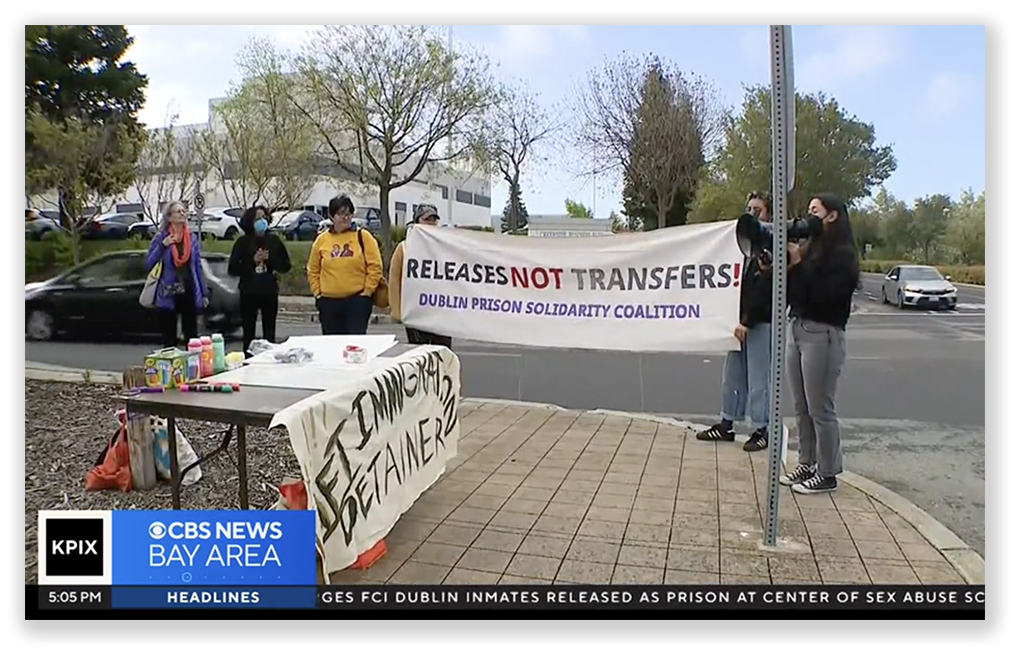We post news and comment on federal criminal justice issues, focused primarily on trial and post-conviction matters, legislative initiatives, and sentencing issues.

‘LOSE WEIGHT AND DRINK WATER’: JUDGE BLASTS BOP OVER FCI DUBLIN CLOSURE
 U.S. District Judge Yvonne Gonzalez Rogers (N.D. Cal.) last week slammed the Federal Bureau of Prison’s April 15 closure of the FCI Dublin women’s prison in a 15-page order that ripped the agency’s “ill-conceived and, like Swiss cheese, full of holes” action, chronicled BOP violations of inmates’ rights, and ordered close monitoring and care of the incarcerated women who were moved to other facilities.
U.S. District Judge Yvonne Gonzalez Rogers (N.D. Cal.) last week slammed the Federal Bureau of Prison’s April 15 closure of the FCI Dublin women’s prison in a 15-page order that ripped the agency’s “ill-conceived and, like Swiss cheese, full of holes” action, chronicled BOP violations of inmates’ rights, and ordered close monitoring and care of the incarcerated women who were moved to other facilities.
The Court noted that the Special Master it appointed in March–due to Dublin’s conditions and alleged staff retaliation–arrived at the prison on April 8 only to find that “the extent of FCI Dublin’s internal deterioration” and operational “conditions worse than BOP officials had led the Court to believe.” The BOP decided to close the facility later that week but buried the announced closure in a sealed attachment to an administrative filing provided to the Court on Friday, April 12.
The Judge complained that the BOP “informed the Court of its intention to close the facility over the following week, without specifying when such closure would begin. The BOP’s obfuscation is obvious. Its lack of transparency with the Court resulted in negative consequences. In fact, BOP Regional Director, Western Region Melissa Rios-Marques refused to advise Special Master [Wendy] Still of the impending closure, which would begin the next day, even when asked directly on Sunday, April 14.”
As some inmates could tell the BOP, that kind of lack of candor with government officials can get you locked up.
 The Order takes the BOP to task for wantonly destroying inmate personal property, denying prisoners due process in disciplinary hearings, and ignoring administrative remedy and compassionate release requests. The Court gave special attention to inmate medical and mental health care. The Judge, who spent nine hours on an unannounced visit to Dublin in February, observed in March that she “heard a refrain so consistent from so many [inmate]s in different quarters and without prompting to demonstrate its reliability: in response to health concerns, medical staff told them to ‘lose weight and drink water.’” Now, the Court found that
The Order takes the BOP to task for wantonly destroying inmate personal property, denying prisoners due process in disciplinary hearings, and ignoring administrative remedy and compassionate release requests. The Court gave special attention to inmate medical and mental health care. The Judge, who spent nine hours on an unannounced visit to Dublin in February, observed in March that she “heard a refrain so consistent from so many [inmate]s in different quarters and without prompting to demonstrate its reliability: in response to health concerns, medical staff told them to ‘lose weight and drink water.’” Now, the Court found that
FCI Dublin has repeatedly failed to follow BOP departmental policy related to completing timely health intakes; sick call access was delayed for extended periods; medical needs, including relative to communicable diseases, went untreated or lacked any follow up; and specialty appointments were not timely scheduled. Relatedly, drug treatment programs were not available for the majority of the population that requested treatment, despite drugs being rampant at the facility. Mental health services were also inadequate. By way of illustration, access to psychiatry services was blocked administratively despite repeated requests from the psychology department itself.
The Court ordered the BOP to provide a weekly status update for each transfer to the judge, the special master and attorneys for the incarcerated women who are suing the bureau. Also, the agency must submit a monthly staffing report for each prison where the women ended up, along with details of the mental health and medical health care they are receiving.
Pat Nolan, who helped draft the Prison Rape Elimination Act and served as a commissioner on the National Prison Rape Elimination Commission, wrote last week in The Hill:
The closure of FCI Dublin is just one more devious attempt by the BOP to make it harder for the inmates to get justice for the assaults they endured. The Bureau of Prisons just cannot be trusted to police itself. Congress is finally moving to impose outside oversight on the runaway agency. The Federal Prison Oversight Act (H.R. 3019) recently passed the Oversight Committee 41-1 and is expected to reach the House floor for a vote by the end of June. Until now the BOP has been able “grade its own papers.” Congress needs to end the cover-ups and pass H.R. 3019 right away.
Noting the timing of the special master appointment and the prison’s closure, Rep. Mark DeSaulnier (D-CA) asked, “So why was this decision made? And was it retaliation in some form or fashion?”
 DeSaulnier and Rep. Bobby Scott (D-VA) wrote to Attorney General Merrick Garland on April 25, criticizing the fact that “incarcerated people and staff are being transferred away from Dublin with almost no notice, no opportunity to prepare, and no opportunity to debrief or receive support. This is particularly concerning in its implications on the ability of Special Master Wendy Still to complete her investigation into the abuses perpetrated at FCI Dublin. Special Master Still requires full access to identify and speak to all victims, witnesses, and perpetrators in these matters in order to properly deliver justice. Without the ability of a proper staff review to be held, potential abusers are now simply returning back into the system with no accountability.”
DeSaulnier and Rep. Bobby Scott (D-VA) wrote to Attorney General Merrick Garland on April 25, criticizing the fact that “incarcerated people and staff are being transferred away from Dublin with almost no notice, no opportunity to prepare, and no opportunity to debrief or receive support. This is particularly concerning in its implications on the ability of Special Master Wendy Still to complete her investigation into the abuses perpetrated at FCI Dublin. Special Master Still requires full access to identify and speak to all victims, witnesses, and perpetrators in these matters in order to properly deliver justice. Without the ability of a proper staff review to be held, potential abusers are now simply returning back into the system with no accountability.”
Order, California Coalition for Women Prisoners v. BOP (Dkt. 300, May 8, 2024), Case No 4:23-cv-4155 (N.D. Cal.)
Associated Press, Closure of California federal prison was poorly planned, judge says in ordering further monitoring (May 9, 2024)
The Hill, Feds close prison dubbed the ‘Rape Club,’ but accountability is needed (May 7, 2024)
Rep Bobby Scott, Letter to Merrick Garland (April 25, 2024)
HR 3019, Federal Prison Oversight Act
– Thomas L. Root














